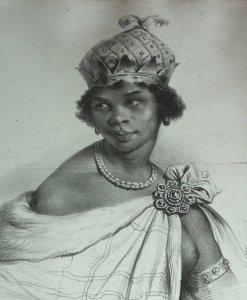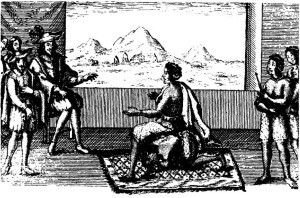 Njinga Mbandi was the Queen of Matamba, inland Angola, from 1587 to 1663. In the coastal and central kingdoms of the African continent, existed an unusual political organization and an economy controlled by the African tribes. At the time, the tribes had set up a network of long-distance trade. The littoral was a place dedicated to fishing and to the production of salt or else goods necessary to life inland.
Njinga Mbandi was the Queen of Matamba, inland Angola, from 1587 to 1663. In the coastal and central kingdoms of the African continent, existed an unusual political organization and an economy controlled by the African tribes. At the time, the tribes had set up a network of long-distance trade. The littoral was a place dedicated to fishing and to the production of salt or else goods necessary to life inland.
The central power was inland. Some tensions appeared in African societies, dealing with political power. Coastal tribes ‘chiefs wanted to set up a trade system with all the peoples of the western coast. After the Portuguese’s arrival, native people created commercial harbors on the Angolan littoral. The trade was based on the cooperation to human traffic from inland to the littoral.
In 1578, the fortified city Săo Paulo de Assunção de Luanda, future capital of Angola, was created on the Mbundi territory. At the time, Ngola Kiluanji, the father of Nzinga Mbandi Ngola, was the king of Mbundus people in Ndongo and Matamba. He managed to contain the Portuguese expansion. He fought and resisted to a strong occupation, but finally fled to Cabassa, in Matamba. When he died, his son Mbandi replaced him. He was the step-brother of Nzinga.. The region was the first victim of the Portuguese colonization and domination. The Portuguese set up a direct trade with the Jagas warriors of the littoral, come from the East, known for Imbagalas. The traffic road was controlled by Ngola Mbandi. The new king sent Nzinga to Luanda to negociate with the Europeans. She did not conceed any territory but converted herself to christianism and received the name of Ana de Sousa. Her sisters Cambi and Fungi converted themselves too and became Barbara and Garcia. Portuguese people did not carry out the treaty of peace and continued the slaves’ trade with Jagas de Cassanje, which created a complete mess in Ngola’s kingdom. Nzinga ordered her uncle’s beheading because he was involved in the human traffic with the Portuguese. She also sent someone to poison her brother, who had not take any measure against Europeans. Then she acceded to the throne and was proclaimed queen. She became the leader of the resistance on Matamba and Ngola’s lands.  To counter Nzinga, Portuguese elected Aiidi Kiluanji (Kiluanji II) as new chief of the Mbundu people, on Ndongo lands. In spite of many treaties, Nzinga did not manage to establish peace with them. She rejected her Christian faith and allied herself to the Jagas warriors from the West. Nzinga and the Jagas attacked the Massange fort in 1640. Her sisters Cambi and Fungi were caught as war prisoners. Fungi was executed Later. Deutsch people invaded and occupied all the Portuguese areas. Some chiefs (sobas) stopped their collaboration with the Portuguese. A few years later, the Brazilian general Salvador Correira Sa y Benevindos reestablished the Portuguese sovereignty in Luanda and tried to settle his reign inland. Nzinga’s army caught two soldiers and took advantage of it to convince the general of her will to convert back to Christianity in exchange of the recognition of Ngola and Matamba’s kingdoms’ sovereignty and the liberation of her sister Cambi.
To counter Nzinga, Portuguese elected Aiidi Kiluanji (Kiluanji II) as new chief of the Mbundu people, on Ndongo lands. In spite of many treaties, Nzinga did not manage to establish peace with them. She rejected her Christian faith and allied herself to the Jagas warriors from the West. Nzinga and the Jagas attacked the Massange fort in 1640. Her sisters Cambi and Fungi were caught as war prisoners. Fungi was executed Later. Deutsch people invaded and occupied all the Portuguese areas. Some chiefs (sobas) stopped their collaboration with the Portuguese. A few years later, the Brazilian general Salvador Correira Sa y Benevindos reestablished the Portuguese sovereignty in Luanda and tried to settle his reign inland. Nzinga’s army caught two soldiers and took advantage of it to convince the general of her will to convert back to Christianity in exchange of the recognition of Ngola and Matamba’s kingdoms’ sovereignty and the liberation of her sister Cambi.
The general accepted the treaty and gave up Ngola’s territories. The Lucala river became the border between the lands. But in 1657, Queen Njinga threatened to declare war again because Cambi was prisoner for more than ten years. She was released in exchange of a hundred slaves. Queen Njinga died on December 17th 1663 in Matamba. Cambi replaced her and carried on the fight against colonial occupation. Queen Njinga used various strategies, amongst which converting herself to Christianism, giving parts of lands or using the Jagas’ warriors. She is considered as a symbol of Africanism against foreign oppression..




